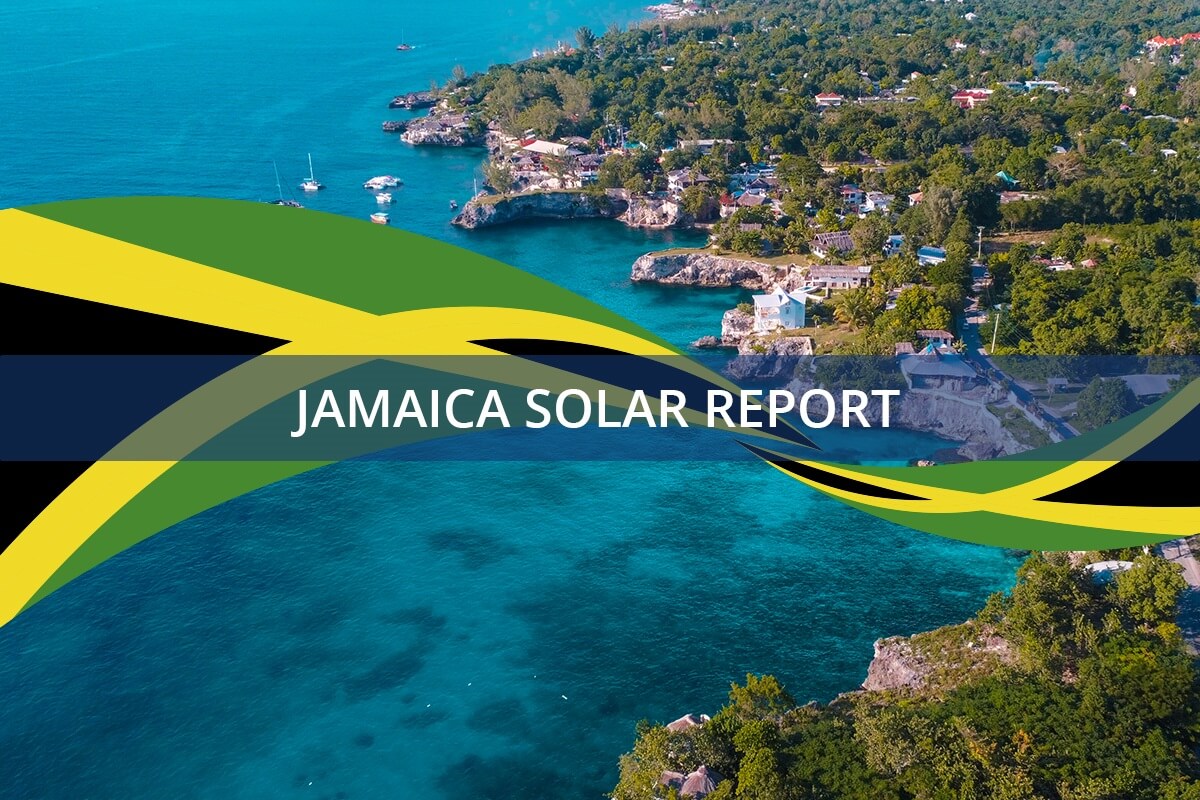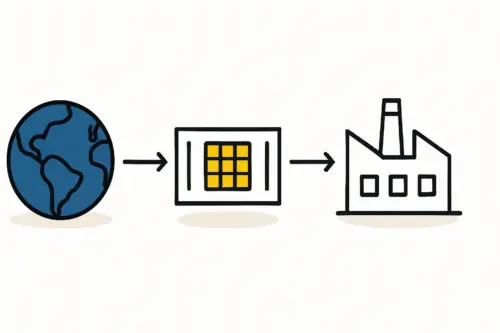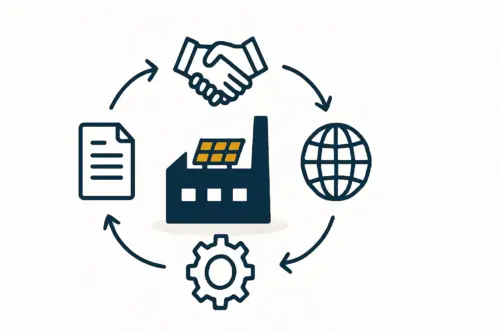Entrepreneurs in the solar industry are often driven by a dual vision: building a business that is both profitable and contributes to a sustainable future. In Jamaica, this vision aligns well with the national agenda.
The country’s updated National Energy Policy sets an ambitious goal of generating 50% of its electricity from renewable sources by 2030. This policy creates a significant market opportunity for local solar module manufacturing, which can reduce the nation’s reliance on imports and build domestic industrial capacity.
However, the journey from a business concept to an operational factory hinges on navigating the critical—and often underestimated—regulatory landscape. For any investor, understanding the sequence of permits, licenses, and agency interactions is fundamental to developing a realistic project timeline and budget. This process, while detailed, is structured and manageable with the right preparation.
The Foundational Steps: Establishing Your Legal Presence
Before ordering equipment or selecting a site, your business must be formally established as a legal entity in Jamaica. This non-negotiable first step underpins all subsequent applications and agreements.
The primary body for this is the Companies Office of Jamaica (COJ). The process is straightforward and involves two main actions:
-
Name Reservation: Ensuring your proposed company name is unique and available.
-
Company Registration: Submitting the articles of incorporation and other required documentation to officially register the business.
Completing this step gives the company a legal identity—necessary for opening bank accounts, signing leases, and engaging with all other government agencies. It is the bedrock upon which the entire venture is built.
Navigating the Investment Landscape with JAMPRO
For any investor, whether international or local, the Jamaica Promotions Corporation (JAMPRO) is an indispensable resource. As the government’s primary investment and trade promotion agency, JAMPRO serves as a central point of contact, designed to streamline the process for new business ventures.
Instead of approaching multiple ministries and agencies independently, investors can work with JAMPRO for coordinated guidance. Its role includes:
Ready to make big Profits?
The solar Industry is Booming
WE HELP NEWCOMERS to the solar industry start their own solar module production line. Customers can make BIG PROFITS by selling modules and finding investors, without wasting money and time on things they don't need!
-
Providing Information: Offering detailed insights into the specific requirements for the manufacturing sector.
-
Facilitating Approvals: Assisting with liaising between other government bodies, such as environmental and planning agencies.
-
Problem-Solving: Helping resolve bureaucratic hurdles that can arise when coordinating between different regulatory entities.
Engaging with JAMPRO early is a strategic move that can significantly reduce delays and prevent common missteps.
Environmental Compliance: The NEPA Mandate
Because a solar module manufacturing plant is an industrial facility, obtaining environmental clearance is a crucial part of the setup process. The National Environment and Planning Agency (NEPA) is the authority responsible for ensuring that all industrial projects comply with Jamaica’s environmental laws.

The core of this process is the Environmental Impact Assessment (EIA). An EIA is a comprehensive study evaluating the potential environmental effects of a proposed factory. It is not just a bureaucratic requirement but a vital planning tool that ensures the facility is designed and operated sustainably.
A typical EIA process involves:
-
Project Screening: NEPA determines if a full EIA is required based on the factory’s scale and nature.
-
Terms of Reference: A document is prepared outlining the specific environmental aspects the EIA must address.
-
Data Collection & Analysis: Consultants conduct studies on air quality, water resources, waste management, and potential social impacts.
-
Public Consultation: The findings are often presented to the local community for feedback.
-
Review and Decision: NEPA reviews the final EIA report and decides whether to grant an environmental permit, often with specific conditions attached.
Properly managing the technical details of the solar panel manufacturing process, such as chemical storage and waste disposal, is essential for a successful NEPA application.
Ensuring Quality and Safety Standards
Once the foundational legal and environmental permits are in place, the focus shifts to operational compliance, ensuring both product quality and workplace safety.
Product Certification with the Bureau of Standards Jamaica (BSJ)
To sell solar modules in Jamaica or export them to other markets (like those in CARICOM), they must meet specific quality and performance standards. The Bureau of Standards Jamaica (BSJ) is responsible for setting and monitoring these standards.
Working with the BSJ ensures that the modules produced are reliable, safe, and perform as specified. This process, which may involve factory audits and third-party product testing, builds market trust and is essential for long-term commercial success.
Operational Safety under the Factories Act
The well-being of employees is protected by the Factories Act, which is enforced by the Occupational Safety and Health (OSH) Department. This legislation requires the factory layout, machinery, and operational procedures to meet strict safety codes to prevent accidents and protect worker health. OSH inspectors typically visit the site to approve the facility before it can become fully operational.
A Strategic Advantage: The Special Economic Zone (SEZ) Framework
Jamaica offers a highly attractive incentive for export-oriented manufacturing businesses through its Special Economic Zone (SEZ) regime, managed by the Jamaica Special Economic Zone Authority (JSEZA). Locating a solar manufacturing plant within a designated SEZ provides substantial financial and logistical advantages.
Key benefits often include:
-
Corporate Tax Relief: A significantly reduced corporate income tax rate (e.g., 12.5% or lower, with possibilities for 0%).
-
Customs Duty Exemption: No duties on imported raw materials and capital equipment.
-
Streamlined Logistics: Simplified customs procedures for both imports and exports.
These incentives can dramatically improve a project’s financial projections and reduce overall investment requirements.
A Practical Perspective on the Jamaican Regulatory Environment

Based on experience from J.v.G. turnkey projects in emerging markets, a common challenge is coordinating between multiple government agencies. While each agency has a clear mandate, their timelines and requirements must be carefully synchronized.
Bureaucratic hurdles are not unique to Jamaica; they are a feature of nearly every robust regulatory system worldwide. The key to success is not avoiding this complexity, but managing it with meticulous planning, early engagement with facilitators like JAMPRO, and a clear understanding of each step. A well-prepared application is far less likely to encounter significant delays.
Frequently Asked Questions (FAQ)
How long does the entire regulatory process typically take?
While this varies with project complexity, a reasonable estimate for obtaining all major permits—from company registration to the environmental permit—is 12 to 18 months. Proactive planning is the best way to stay within this timeframe.
Is a local partner required to start a manufacturing business in Jamaica?
A foreign investor is not legally required to have a local partner. However, partnering with a local entity or hiring experienced local consultants can be highly beneficial for navigating administrative processes and understanding the business culture.
What are the most common reasons for delays?
The most frequent delays stem from incomplete or inadequate documentation, particularly for the Environmental Impact Assessment (EIA). Underestimating the time required for inter-agency reviews is another common planning error.
Do these regulations apply equally to a small-scale (e.g., 20 MW) factory?
Yes, the core principles of business registration, environmental compliance, and safety standards apply to all industrial operations, regardless of scale. However, the complexity and scope of certain requirements, such as the level of detail needed in an EIA, may be adjusted based on the factory’s size and potential impact.
Your Next Steps in Planning
Successfully navigating Jamaica’s regulatory framework is a matter of structured planning and due diligence. The path is well-defined, and the government has established clear points of contact, like JAMPRO, to assist investors.
With these approvals secured, your focus can shift to the equally important tasks of factory design, equipment procurement, and team building. Understanding this roadmap is the first step. The next is to develop a comprehensive business plan that integrates these regulatory timelines and costs into a complete financial and operational model.






